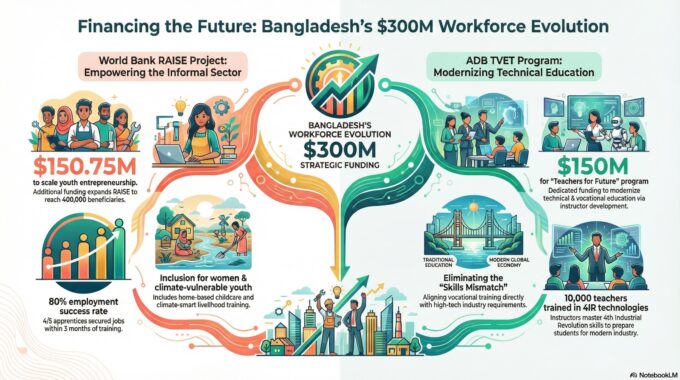The interim government is set to unveil a Tk 7.9 trillion national budget for the 2025–26 fiscal year on June 2, marking a critical juncture for Bangladesh as it confronts rising economic challenges while attempting to steer the country toward stability and growth.
Finance Adviser Dr Salehuddin Ahmed will deliver the budget speech through a pre-recorded broadcast scheduled for 4:00 PM on Bangladesh Television (BTV) and Bangladesh Betar. Private television channels and radio stations have been instructed to relay the address simultaneously using BTV’s official feed.
This will be the first budget under the newly appointed administration. The government faces the daunting task of taming persistent inflation, stimulating private investment, and expanding social safety nets amid continued global and domestic uncertainties.
At Tk 7.9 trillion, the proposed budget is slightly lower—by Tk 0.07 trillion—than the current fiscal year’s Tk 7.97 trillion allocation. Finance Ministry officials indicated that this modest reduction aligns with the administration’s strategy of fiscal consolidation, aimed at crafting a more efficient and implementable financial framework.
The projected budget deficit stands at Tk 2.26 trillion, a reduction from Tk 2.56 trillion in the current fiscal year, and represents 3.62% of the GDP. To finance this gap, the government plans to rely on external borrowing, bank loans, and sales of savings certificates.
For FY26, the government has set an ambitious GDP growth target of 5.5%, slightly above the revised 5.25% for the ongoing fiscal year. However, multilateral institutions such as the World Bank, International Monetary Fund (IMF), and Asian Development Bank (ADB) forecast that Bangladesh’s growth may remain below 5.0%, pointing to lingering structural and external challenges.
Inflation control remains a cornerstone of the new budget, with the government targeting a reduction to 7.0%. Nonetheless, economists caution that sustained inflationary pressures could undermine this goal.
To cushion vulnerable populations, the upcoming budget will expand social safety net programs—broadening coverage and raising benefit amounts. Major allocations will prioritize agriculture, healthcare, education, and technology development.
The Annual Development Programme (ADP) will be set at Tk 2.3 trillion, down from Tk 2.65 trillion in the current year, indicating a more focused and possibly pragmatic investment strategy.
The Finance Adviser has signaled that the budget will be business-friendly, with new tax policies designed to boost investment, stimulate GDP growth, and support job creation.
The revenue collection target for FY26 is set at Tk 5.18 trillion, up from Tk 4.8 trillion in the current fiscal year. However, under the IMF’s reform agenda, a more aggressive target of Tk 5.8 trillion has been recommended to improve fiscal resilience.
Non-development expenditure is expected to rise, with key allocations earmarked for debt servicing, food subsidies, and reforms in the banking sector. The non-development budget is projected to hit Tk 5.6 trillion, an increase of Tk 0.28 trillion from the current year.
To address the capital shortfall in state-owned banks, the government is also planning a dedicated budget allocation. Subsidies in critical sectors such as agriculture, fertilisers, and electricity will continue in an effort to stabilise essential industries and protect consumers.
Public sentiment ahead of the budget is mixed—hopeful for stronger safety nets and inflation relief, yet cautious about execution challenges. Economists have stressed that the success of the budget depends heavily on structural reforms and implementation efficiency.
Experts also advocate for enhanced wealth taxation and stronger enforcement mechanisms to expand the direct tax base and reduce reliance on indirect taxes, which often disproportionately affect lower-income groups.
As the nation awaits the June 2 announcement, the upcoming budget is widely seen as a litmus test for the interim government’s ability to manage economic recovery during a politically sensitive transition period.
For more updates, be with Markedium.










































Leave a comment